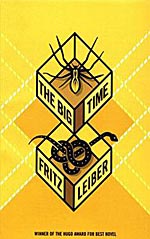
![]() couchtomoon
couchtomoon
1/25/2014
![]()
A Nazi, a Roman, and an English poet walk into a bar set in the Void of the Universe…
– Stop me if you've heard this one…–
That's where Leiber starts his weird tale about temporally mismatched barroom patrons unwinding after a battle in the destructive Change War. It gets more bizarre as his Time Soldiers alternately carouse and argue with some lady "ghosts", a fuzzy-tentacled moon alien, a satyr, and a Minoan warrior chick, with a devil horn hairdo and an atom bomb. Escorts are provided for amusement, one of whom narrates the story, in her unsophisticated and puerile way.
The Change War is fought between cryptic rivals, the Spiders and the Snakes, within the Void of the universe. Leiber's stage is the Void bar, his cast are the patrons, and, naturally, (although nothing about this book is natural), the hijinks ensue.
The terms "stage" and "cast" are appropriate here. Leiber's theater background is evident in the amplified, hyperbolic tone of the novel, and the exhibitive positioning of the characters evokes stage blocking. Characters monologue in dramatic sweeps to the rest of the group. They even break out into song at times.
It's pure camp. And the people who don't realize that are the ones who don't like it. (I typically avoid others' reviews until I have written my own, but the multitudes of 1-star reviews on Goodreads were impossible to ignore.) Leiber's style is jarring and disorienting. He's not going to hold your hand and set up the background. He's not going to explain why fuzzy Lunar octopodes, or Venusian satyrs, have been chosen to fight in this incomprehensible war that affects the outcomes of major Earth events. It can be difficult to acclimatize to his world.
But part of that is the fault of Leiber's chosen narrator, Greta Fonzane. First-person narration irks me, especially when it's done colloquially, and Greta is none-the-better for it. But, then I just had to tell myself, "Megan, you just better pull up your big girl panties and deal with it. This girl just isn't going to explain things coherently." (That's just an example of her irritating narrating style.)
But, the informal, unreliable narrator fits for this type of story. Greta is an escort; her job is to amuse, entertain, and distract (and serve as pleasure or punchbag, she hints at times). She is neither deep, nor intelligent, (although she can be clever, when it suits her). She references things in passing, without clarification, that the reader was not present for. There were a few times that I was convinced I must have forgotten a scene that Greta referenced. It's confusing, but that's just Greta being Greta, and Leiber will get her to fill in the details, or more context will be provided, if it's important.
As it turns out, most of her babble is important, and the story wraps up neatly. It even gets profound at the end, with talk about the significance of change, love, and human evolution. And Leiber confirms what we all suspect: Nazi's are assholes, no matter their location in time and space.
This is a great example of weird fiction, and it's no surprise that this novel blew people's minds in 1958. The bizarre combination of characters and metaphysical setting provide a unique and fascinating reading experience. The story is so bizarre, it doesn't even feel dated. This story would best be served on stage, but it's still a fun read.
http://couchtomoon.wordpress.com/2014/01/24/the-big-time-by-fritz-leiber/